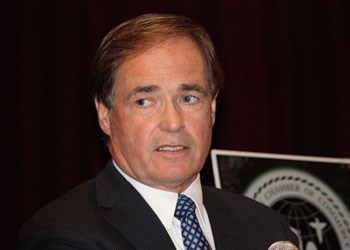NDP leader Dwain Lingenfelter has a few concerns about the state of the province, and was recently at a Chamber of Commerce luncheon in Yorkton to share those concerns with people and present his solutions.
The core of Lingenfelter's views rely on his view of how to build a successful economy. He notes that an area needs strong businesses to be successful, but those businesses need a well paid work force with the ability to spend and support the economy and a strong government to be able to support everyone. He compares countries with little government regulation and a low-paid work force such as Ecuatorial Guinea to countries with a well paid workforce and strong government like Saskatchewan and Norway, and notes that the former is not a place to invest, while the latter are economic leaders.
"Get that balance right between government, business and labor and you have a modern, successful economy," Lingenfelter says.
However, he also believes that in some areas that balance is not right. He says potash royalties are too low, and are not going to the people of the province who own the resource.
He compares the royalty rates for potash to the royalty rates for oil in the north sea in the UK. Lingenfelter says that Saskatchewan controls a much greater percentage of the world's potash supply than the UK does the world's oil supply, but the UK has recently raised royalty rates on that resource by 10 per cent. He believes that an increase in potash royalties is important to pay for the province's plans.
Addressing concerns that increased royalty rates would scare away potash companies, he adds that no company would refuse the profits generated by the mines, and that plans were put in place before the price of the resource increased.
"They made their decision to expand when potash was less than $200/tonne. It's now close to $400. Why would we give away all the benefits of the resource which we own to a company whose shareholders don't live here?" he questions.
The solution, Lingenfelter suggests, is to negotiate a new royalty scheme which would bring the province a larger percentage. He notes that if the province took half of the gross profit, PotashCorp would still be making billions, but the province would also be making billions. He admits that the executives might not be happy, but says they're going to still invest in the province.
The other main concern he addressed was increasing rent in the province. As the rent increases reduce residents' ability to spend and contribute to the economy, they have a negative effect. Lingenfelter notes that in some areas, such as a recent case in a Regina apartment building, rents have been going up by as much as 100 per cent.
"If the premier believes that it is not right, then he should do something. I believe that modern day rent control, which works for 80 per cent of the families in Canada would help... In Winnipeg 807 new apartments were built, with a rent control of one per cent. In Saskatchewan, it was 300 in the whole province."
The main criticism with rent control is that it could stifle growth in a rental stock. Lingenfelter believes there are solutions to prevent this problem. He suggests that new builds be exempt, as would units that are being extensively renovated or those which are operated by those only offering one or two units. The focus of his rent control plan would be preventing large increases for no reason, and limiting increases to one or two per cent annually to prevent gouging.
Rent control would not be the only program, Lingenfelter notes, and he says that government supported housing builds would be also necessary to expand the housing stock. He says rent control is an interim measure, until housing stock can be increased it keeps the stock that exists from being outside of the budget of most people.
While the NDP will be unveiling more policies as the provincial election approaches, Lingenfelter says these are the most pressing concerns for the people of the province.




